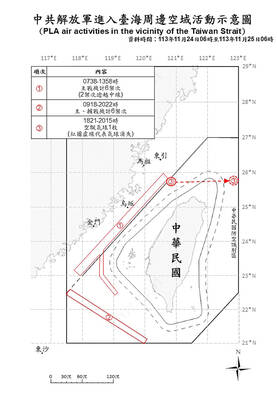Taiwan’s western coastal floodplains have shrunk by 58 percent from the 1950s to the 2010s, a steep decline that threatens wetland ecology and migratory birds, the Endemic Species Research Institute said in a study.
The losses are the result of reclamation and construction projects for dams, reservoirs, harbors, airports, farms and aquafarms, the Ministry of Agriculture-run institute said in a news release.
Although halted in the past few years, the decline spells trouble for the environment, as shellfish-rich floodplains are essential to sustain species that rely on wetlands, including migratory birds, it said.

Photo courtesy of the Endemic Species Research Institute
Compromising the wetlands would be a devastating blow to migratory waterfowl populations that use it as a way station during their sojourn between East Asia and Australasia, the institute said.
Changhua County’s Hanbao (漢寶), Fangyuan (芳苑) and Dacheng (大城) townships are the only wetlands remaining that have fully intact floodplains, it said.
The study, “Losing tidal flats at the midpoint of the East Asian-Australasian flyway over the past 100 years,” was published in the journal Wetlands on May 22. It used topographic maps and Landsat Archive images from the 1920s to the 2020s to determine the trajectories of tidal flat change on Taiwan’s coasts.
Asia has lost the most floodplain area in the world due to rapid industrialization over the past century, said Lin Ruey-shing (林瑞興), an institute researcher and a coauthor of the paper.
The government must exercise more care in coastal land utilization following global biodiversity guidelines, Lin said, adding that the green energy initiative has been harmful to floodplains.
For example, the government zoned part of Changhua’s wetlands as industrial areas, allowing solar panels to be installed in floodplains, he said.
Officials are debating whether to include the effects on ecology as a metric in environmental impact assessments for permits to build renewable energy infrastructure, he said.

Theaters and institutions in Taiwan have received 28 threatening e-mails, including bomb threats, since a documentary critical of China began being screened across the nation last month, the National Security Bureau said yesterday. The actions are part of China’s attempts to undermine Taiwan’s sovereignty, it said. State Organs (國有器官) documents allegations that Chinese government officials engage in organ harvesting and other illegal activities. From last month to Friday last week, 28 incidents have been reported of theaters or institutions receiving threats, including bomb and shooting threats, if they did not stop showing the documentary, the bureau said. Although the threats were not carried out,

‘GRAY ZONE’ TACTICS: China continues to build up its military capacity while regularly deploying jets and warships around Taiwan, with the latest balloon spotted on Sunday The US is drawing up contingency plans for military deployments in Japan and the Philippines in case of a Taiwan emergency, Japan’s Kyodo news agency reported. They would be incorporated in a first joint operation plan to be formulated in December, Kyodo reported late on Sunday, citing sources familiar with Japan-US relations. A US Marine Corps regiment that possesses High Mobility Artillery Rocket Systems — a light multiple rocket launcher — would be deployed along the Nansei Island chain stretching from Kyushu to Yonaguni near Taiwan, Kyodo said. According to US military guidelines for dispatching marines in small formations to several locations,

As Taiwan celebrated its baseball team’s victory in the World Baseball Softball Confederation’s Premier12 on Sunday, how politicians referred to the team in their congratulatory messages reflected the nation’s political divide. Taiwan, competing under the name Chinese Taipei (中華台北隊), made history with its first-ever Premier12 championship after beating Japan 4-0 at the Tokyo Dome. Right after the game, President William Lai (賴清德) congratulated the team via a post on his Facebook page. Besides the players, Lai also lauded the team’s coaching and medical staff, and the fans cheering for them in Tokyo or watching the live broadcast, saying that “every

The Mainland Affairs Council (MAC) yesterday confirmed that Chinese students visiting Taiwan at the invitation of the Ma Ying-jeou Foundation were almost all affiliated with the Chinese Communist Party (CCP). During yesterday’s meeting convened by the legislature’s Foreign Affairs and National Defense Committee, Democratic Progressive Party (DPP) Legislator Michelle Lin (林楚茵) asked whether the visit was a way to spread China’s so-called “united front” rhetoric, to which MAC Deputy Ministry Shen You-chung (沈有忠) responded with the CCP comment. The MAC noticed that the Chinese individuals visiting Taiwan, including those in sports, education, or religion, have had increasingly impressive backgrounds, demonstrating that the